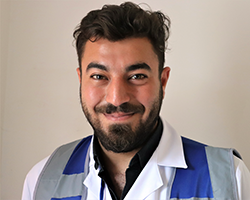
Photo: WHO/Irmak Alpagut
The Community Health Support Staff (CHSS) project supports the employment of Syrian personnel in the Turkish health sector. It acts as a bridge between homebound patients and Migrant Health Centres by having CHSS on the constant lookout for more complicated health issues that may require intervention by a doctor from the Refugee Health Training Centre.
As part of the programme CHSS can attend trainings on providing home care to the elderly and disabled, which are regularly offered by WHO. This gives employment opportunities to the participants and provides access to primary health care services to the patients.
The programme was launched in WHO’s seven Refugee Health Training Centres in 2018. As of January 2020, 279 CHSS members have been hired and 815 patients have benefited from home care services.
The project is run jointly by the World Health Organization and the Turkish Ministry of Health and funded by the German Government through KfW Development Bank.
“I was working for the Red Crescent in Syria, applying medical dressings to injured people. I have seen lots of mutilated bodies,” explains 22-year-old Bashar.
After working voluntarily for 2 months with the Syrian Arab Red Crescent, Bashar underwent basic first aid training. “Our team’s duty was to help injured people immediately after bombings,” he says.
Bashar came to Turkey with his family 4 years ago. He finished WHO’s training programme to become a community health support worker providing health care, home care and social services for older and disabled Syrian refugees.
“After my past experience, I feel more comfortable helping these people in their homes. During the practical training period we visited more than 28 houses. There was not any problem for me,” he says.
This project is funded by the German Federal Government through KfW Development Bank.




